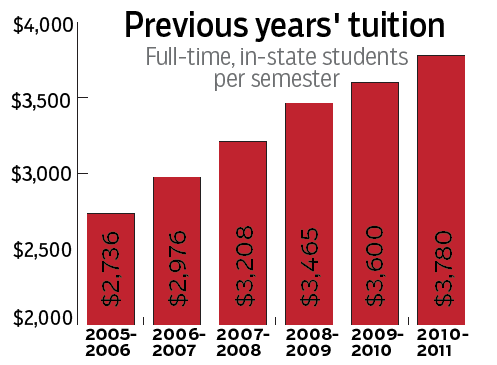Regents will vote on tuition hike in June
April 22, 2011
Battling a cycle that combines increasing operating costs with diminishing state funding, WKU is expecting to again raise tuition an estimated 5 percent this fall.
“It’s inevitable in higher education,” President Gary Ransdell said.
A tuition hike won’t be passed at the April 29 Board of Regents meeting, Ransdell said, as the Council on Postsecondary Education will have just met on April 28 to cap tuition hikes for public universities.
Ransdell said the Board of Regents will vote on the proposed tuition increase at a special meeting on June 24 when setting the budget.
The cap for WKU, considered a comprehensive university, is expected to be 5 percent. Research institutions such as the University of Louisville and University of Kentucky will be allowed 6 percent.
WKU and Murray State will propose their tuition increases on April 28, along with WKU’s student fee to pay for Downing University Center renovations, said John Hayek, senior vice president for Budget, Planning and Policy for the CPE. Approval could potentially take until the CPE’s June meeting.
Ann Mead, vice president for Finance and Administration, said WKU will make it so students — as well as scholarship and financial aid offices — are well aware of the increase before it’s made official in June.
The Board of Regents last year also approved a 5 percent tuition hike in June.
“An increase of $200 or less is not going to adversely affect most students,” Mead said. “It’s a relatively small increase, and most students should be able to accommodate it.”
Spring 2011 tuition for full-time, in-state students was $3,780 ($315 per credit hour) and $9,420 ($785 per credit hour) for out-of-state students.
Ransdell said $9.5 million in state cuts since 2008 have put pressure on universities to continue raising tuition. He said two straight legislative sessions have passed where the state hasn’t been able to pay maintenance costs on buildings it owns — for instance, Ransdell Hall.
“Those were expenses we didn’t have on our budget a few years ago,” Ransdell said. “We’re at a period of time right now where tuition increases are just barely covering our fixed-cost increases.”
Mead said the economy hasn’t bounced back enough for the state to begin delegating more money toward education.
“We wish there wasn’t a rate increase,” she said. “These have been hard decisions to balance the budget for next year.”
WKU also announced in March more than $2.3 million in budget cuts across all university divisions. The cuts were in response expiring funding to universities via the American Recovery and Reinvestment Act of 2009.
Despite budget cuts and tuition hikes, Ransdell said WKU remains under pressure to keep pace with technology, pay for relatively high energy usage because of buildings and dorms, as well as hire “the brightest people in the world.”
“We’re getting a lot of shifting of costs to the campus that we’ve got to absorb that are pretty tough to swallow,” Ransdell said. “The good news for us is we continue to grow, and we continue to be a destination spot for students.”













